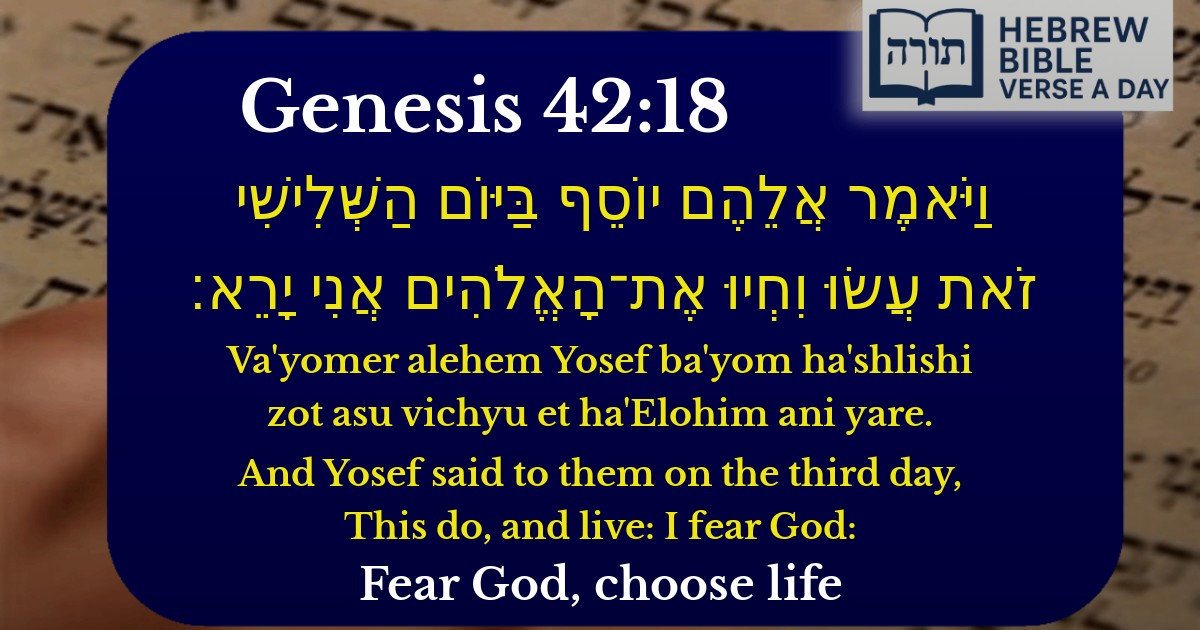Frequently Asked Questions
Q: What does Yosef mean when he says 'I fear God' in Genesis 42:18?
A: When Yosef says 'I fear God,' he is emphasizing that his actions are guided by a deep reverence for Hashem. According to Rashi, this statement was meant to reassure his brothers that he would deal with them justly and honestly, despite their past mistreatment of him. It teaches that true leadership and decision-making should be rooted in yirat Shamayim (fear of Heaven).
Q: Why did Yosef wait until the third day to speak to his brothers in Genesis 42:18?
A: The Midrash (Bereshit Rabbah 91:6) explains that Yosef waited three days to give his brothers time to reflect on their situation and repent for their past actions. This mirrors the Jewish concept of 'teshuvah' (repentance), where time for introspection is necessary. Additionally, the number three often symbolizes completeness or preparation in Jewish tradition.
Q: What lesson can we learn from Yosef's statement 'This do, and live' in Genesis 42:18?
A: Yosef's instruction 'This do, and live' teaches that following ethical and God-fearing directives leads to true life and sustenance. The Rambam (Hilchot De'ot 1:7) explains that living according to divine wisdom ensures both physical and spiritual well-being. Yosef, as a righteous leader, shows that survival depends not just on food, but on moral conduct.
Q: How does Yosef's fear of God in Genesis 42:18 apply to our lives today?
A: Yosef's declaration reminds us to make all decisions—whether in business, family, or community—with yirat Hashem (fear of God). The Talmud (Pesachim 50b) states that everything should be done 'for the sake of Heaven.' Like Yosef, we must act with integrity, especially when in positions of power or influence.
Q: Why is the phrase 'I fear God' significant in Yosef's conversation with his brothers?
A: This phrase is significant because it establishes Yosef's credibility and moral compass. According to the Sforno, Yosef wanted his brothers to know that his actions were not driven by personal vengeance but by divine justice. It also echoes Avraham's response in Genesis 22:12, showing that true righteousness involves fear of God in all circumstances.


Context of the Verse
The verse (Bereshit 42:18) occurs during Yosef's interaction with his brothers, who came to Egypt seeking food during the famine but did not recognize him. Yosef, now the viceroy of Egypt, had initially accused them of being spies and imprisoned them for three days before speaking these words.
Yosef's Declaration of Fear of G-d
Yosef's statement, "I fear G-d" (אֶת־הָאֱלֹהִים אֲנִי יָרֵא), is significant in this exchange. Rashi explains that Yosef was assuring his brothers that he would not act unjustly toward them, as his reverence for G-d governed his conduct. This declaration was meant to alleviate their fears and establish trust.
The Third Day
The mention of "the third day" (בַּיּוֹם הַשְּׁלִישִׁי) is interpreted by the Midrash (Bereshit Rabbah 91:7) as a hint to future redemption. Just as Yosef's brothers were released on the third day, so too would the Jewish people experience salvation on the third day (as referenced in Hoshea 6:2, "On the third day, He will raise us up").
Yosef's Instructions: "This do, and live"
The phrase "This do, and live" (זֹאת עֲשׂוּ וִחְיוּ) is analyzed by Ramban (Nachmanides), who explains that Yosef was offering them a way to prove their honesty and thereby secure their survival. The Malbim adds that Yosef's conditions were designed to test their integrity and familial loyalty, particularly concerning Binyamin.
Moral and Ethical Lessons